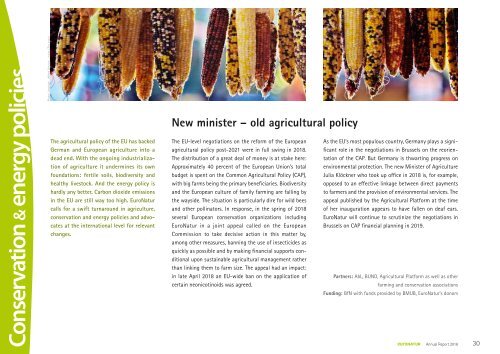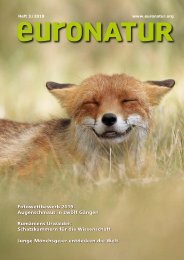Annual Report 2018 EuroNatur Foundation
Here you can get a good overview about our conservation programmes in Europe. Conatains also financial information.
Here you can get a good overview about our conservation programmes in Europe. Conatains also financial information.
Create successful ePaper yourself
Turn your PDF publications into a flip-book with our unique Google optimized e-Paper software.
Conservation & energy policies<br />
Photo: Unsplash - Alfred Schrock - maize (Zea mays)<br />
The agricultural policy of the EU has backed<br />
German and European agriculture into a<br />
dead end. With the ongoing industrialization<br />
of agriculture it undermines its own<br />
foundations: fertile soils, biodiversity and<br />
healthy livestock. And the energy policy is<br />
hardly any better. Carbon dioxide emissions<br />
in the EU are still way too high. <strong>EuroNatur</strong><br />
calls for a swift turnaround in agriculture,<br />
conservation and energy policies and advocates<br />
at the international level for relevant<br />
changes.<br />
New minister – old agricultural policy<br />
The EU-level negotiations on the reform of the European<br />
agricultural policy post-2021 were in full swing in <strong>2018</strong>.<br />
The distribution of a great deal of money is at stake here:<br />
Approximately 40 percent of the European Union’s total<br />
budget is spent on the Common Agricultural Policy (CAP),<br />
with big farms being the primary beneficiaries. Biodiversity<br />
and the European culture of family farming are falling by<br />
the wayside. The situation is particularly dire for wild bees<br />
and other pollinators. In response, in the spring of <strong>2018</strong><br />
several European conservation organizations including<br />
<strong>EuroNatur</strong> in a joint appeal called on the European<br />
Commission to take decisive action in this matter by,<br />
among other measures, banning the use of insecticides as<br />
quickly as possible and by making financial supports conditional<br />
upon sustainable agricultural management rather<br />
than linking them to farm size. The appeal had an impact:<br />
in late April <strong>2018</strong> an EU-wide ban on the application of<br />
certain neonicotinoids was agreed.<br />
As the EU’s most populous country, Germany plays a significant<br />
role in the negotiations in Brussels on the reorientation<br />
of the CAP. But Germany is thwarting progress on<br />
environmental protection. The new Minister of Agriculture<br />
Julia Klöckner who took up office in <strong>2018</strong> is, for example,<br />
opposed to an effective linkage between direct payments<br />
to farmers and the provision of environmental services. The<br />
appeal published by the Agricultural Platform at the time<br />
of her inauguration appears to have fallen on deaf ears.<br />
<strong>EuroNatur</strong> will continue to scrutinize the negotiations in<br />
Brussels on CAP financial planning in 2019.<br />
Partners: AbL, BUND, Agricultural Platform as well as other<br />
farming and conservation associations<br />
Funding: BfN with funds provided by BMUB, <strong>EuroNatur</strong>’s donors<br />
<strong>Annual</strong> <strong>Report</strong> <strong>2018</strong><br />
20<br />
30





